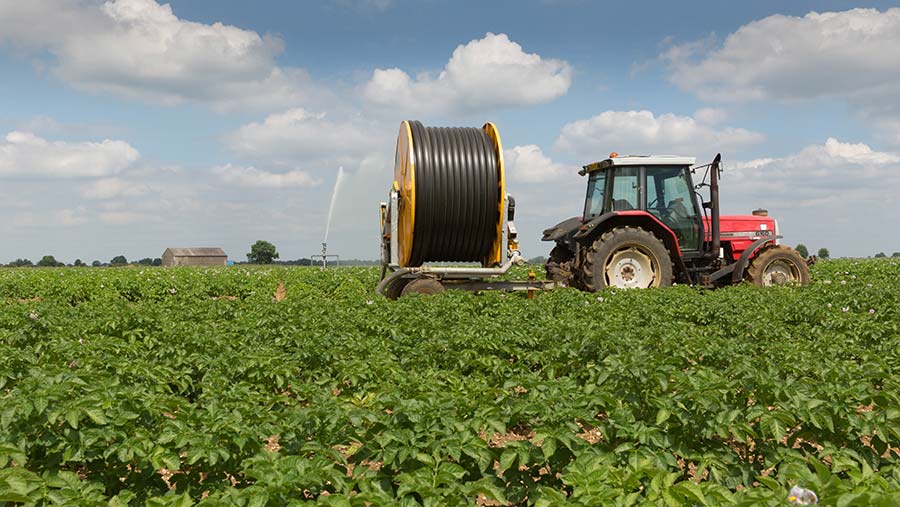Farmers’ irrigation worries mount on back of EA predictions
 © Tim Scrivener
© Tim Scrivener Farmers could see tougher irrigation restrictions this summer, following the release of new Environment Agency (EA) data.
The updated “Prospects for irrigation” forecast comes as bad news for many growers, including those in East Anglia, Lincolnshire and Northamptonshire, where the prospects have been downgraded to “poor”, meaning significant restrictions on abstraction from surface and groundwater are probable.
It follows low April rainfall and Met Office predictions suggesting drier-than-average conditions and above-average temperatures are more likely than wetter and cooler ones between May and July.
See also: Farmers must have access to fair share of water
According to the NFU’s national water specialist, Paul Hammett, the industry is bracing itself for a challenging summer.
“Overall, we remain really concerned, but any rainfall will be of considerable help, so we’re not panicking,” he said.
“We know there will be issues, but it’ll be a question of how widespread they will be. If we get normal rainfall and temperatures through the summer, many farmers might still be OK.”
‘Plan ahead’
Mr Hammett advised farmers to make plans now to manage potential water shortages and called on the EA to continue being up-front about the state of play.
“The EA hasn’t got a crystal ball, so can’t answer all the questions, but it’s important they carry on sharing information to help farmers, because the risk always falls at the farmers’ feet. We need to know what’s happening, so we can hopefully avoid any surprises,” he said.
Norfolk grower Nick Deane said while there is no point in panicking, it is prudent to prepare for the worst.
“You’ve got to think of your priorities,” said Hoveton-based Mr Deane, who is “considering hard” whether it’s worth irrigating cereals or if that water would be better kept for his higher-value potato crop.
If there is a repeat of last year’s situation, the whole nation should share the burden of limited supplies, he said.
“We would expect the EA to be treating the public water supply in just the same manner as they will be treating irrigation abstraction licences for agriculture.
“We need to think sensibly about how we allocate a scarce resource, which water could be over the next three to four months. Domestic fruit and vegetable production to feed the nation has got to be nearly as critical as the water through the tap.”
Crop quality and yield concerns
Andrew Blenkiron, manager of the Euston Estate near Thetford, in Suffolk, said many are facing a difficult season, with water shortages potentially hitting crop quality, as well as yields.
“I think people will be able to deliver crops, though, so we don’t want to be putting panic into the marketplace. If we get average rainfall through this summer, everything could still be reasonably OK.”
It has been a wet week across England. However our weekly report shows river flows decreased at the majority of rivers we report on and the majority remain below normal or lower for the time of year https://t.co/qHOXccyWRE #rainandriverdata pic.twitter.com/WaZ4gUwc5c
— Environment Agency (@EnvAgency) May 10, 2019
However, huge problems – both for agriculture and public water supply – could be on the cards next year if there is another dry winter, he warned.
The “frightening” EA statistics highlight the need for farmers to think more strategically about long-term drought planning, added Mr Blenkiron.
“This cycle of events is going to occur much more frequently so – along with persuading the public to reduce water use and getting public water supply companies to reduce leakage – farmers should be investing in more water storage infrastructure. There’s a potential opportunity now while relatively long-term cheap money is available.”
Top tips for water-savvy farming from the AHDB
- Ensure water is applied as efficiently as possible to make it last the season
- Reassess your irrigation strategy based on crop value and contracts against likely water availability
- Check pipes and equipment to ensure water is not leaked and lost
- Use available storage capacity and apply to the EA to fill reservoirs out of season in the event that some abstraction is possible
- Trade water with neighbours
- Consider alternative sources that are available for use in an emergency (for example boreholes, mains water, tankered water)

